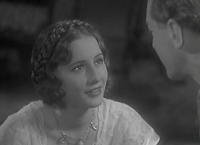 |
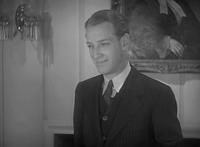 |
 |
| Mary Archer Barbara Stanwyck |
Hugo Wilbrandt Otto Kruger |
Jeff Archer Ralph Bellamy |
Proof That It’s Pre-Code
- Get this– Americans can be huge douches.
- We get to hear gossip about what the Germans did to a pair of nurses, and what they do to all of their prisoners– or, as one spinster put it, “I thought they only did those things in the Bible!”
- A big plot point involves cousinly love.
- Some justifiable homicide and a suicide are thrown in just to make things interesting.
Ever in My Heart: What’s In A Name
“Folks don’t get away from the blood in their bones.”
When I was a kid, there was a TV movie that came on called The Canterville Ghost starring Patrick Stewart and Neve Campbell. Don’t bother looking it up, it’s real, and it’s awful. That was one of the first movies that wildly upset me, and not because the film is such a stunning piece of work, but rather the way the movie unfolded: no matter how desperately Campbell tried to convince her parents that there’s a ghost (which there is), they won’t believe her. In fact, they start berating and mistreating her for her simple insistence.
This complete lack of human sympathy and emotion frustrated me, but at the time I couldn’t explain why. Nowadays I understand better: the film would fall apart if her parents for a moment behaved like rational, caring individuals. The concerns of the screenplay to make a film more dramatic overrode everything else.
And that rather lengthy tale brings me to Ever in My Heart, a ludicrous string of events that takes on a rather ugly subject matter and gets all goofy with it. Imagine Rocky IV, after the famous speech in the ring, ends with Ivan Drago pulling out a gun and then Rocky kickboxing his head off and you’ll be in similar territory.
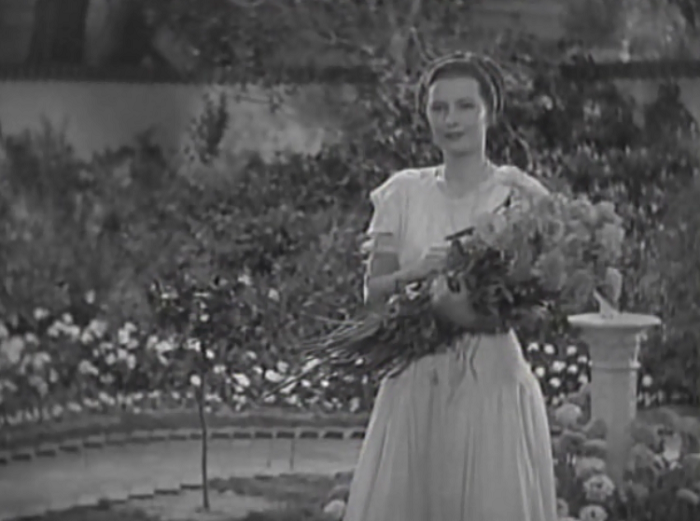
Stanwyck could probably have kickboxed off Stallone’s head in the early 80s too. If she’d wanted to.
And it pains me to say that (not just because seeing the special effects work of Dolph Lundgren getting his head kicked off would make a hilarious .gif) because Ever in My Heart has something to say, namely that anti-German sentiment stirred up during the first world had disastrous consequences for many honest American citizens.
First off– a government and the media fanning the flames of racial hatred to justify warmongering? I know, as absolutely ludicrous as that sounds, it happened here with the Germans and, when FDR didn’t want a repeat of it in the 40s, he choose to instead target the far more noticeably different Japanese. It’s also occurred with other ethnic minorities in far more recent wars, but I’d be hard pressed to put my finger on who that is…
The story of Ever in My Heart begins in 1909 with a young woman named Mary preparing her family’s mansion for the return of her cousin, Jeff. She and Jeff had been childhood sweethearts (and, uh, cousins), but it’s not Jeff she makes goo-goo eyes at upon his arrival, but his new German friend Hugo.
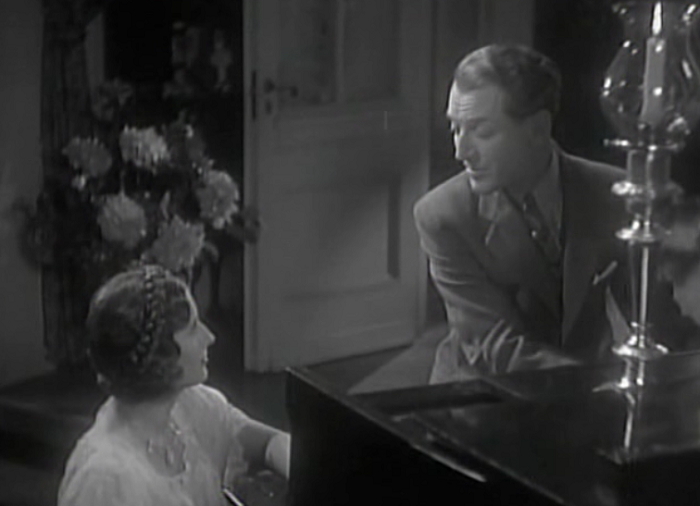
Goo goo all over you, baby.
The Archers, being a family that apparently inbreeds like it’s going out of style, are very dismissive of Mary. The town they live in, Archerville, boasts war memorials laden with Archers. They’re a proud family of gossipy spinsters, and aren’t too happy about a kraut jumping into their private gene pool.
Unfortunately for them, Hugo and Mary are quite happy. He sings her German lullabies, buys her a little German dachshund to go along with their little German baby, and then Hugo goes and becomes an American citizen just for kicks. Hugo invites all of his friends and colleagues over to celebrate– he’s a professor at the local college– and they take turns singing songs from their homelands, France, England, and Germany.
Since everything is perfect and wonderful, however, that must mean it’s time for act two to kick in. While everyone’s singing inside, news of Germany’s invasion into Belgium is on the cover of the newspaper outside. Crap is about to hit the crap fan.
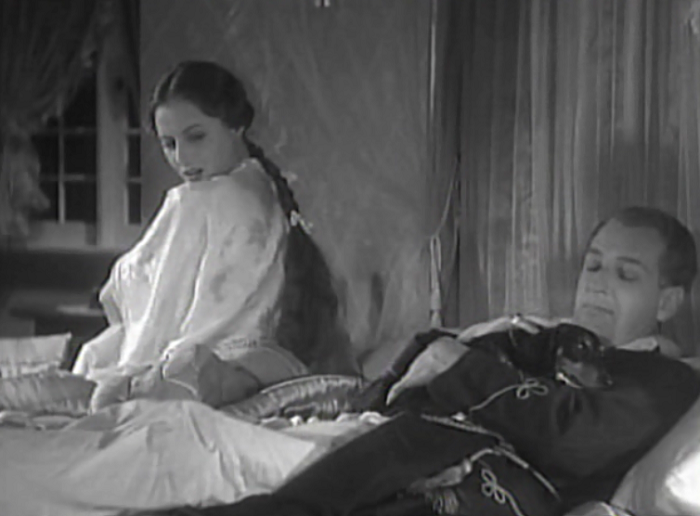
“What do you mean a ‘great war’? How great is it?!”
If the movie hadn’t been laying it on thick before, well, here we go. Hugo is released from his job because he’s a German. Mary’s friends avoid her because of her husband’s nationality. Her family gossips about the atrocities that the yellow papers pin on the Huns.
The problems pile up. Without money, the couple is helpless as their adorable son dies from disease. Soon after, their dog is chased by neighborhood kids and beaten so badly that Hugo has no choice to put a bullet into it and end its misery.
It’s gruesome stuff, certainly, and a gut wrenching portrayal of how much it hurt to be on the bad side of the American people, whose ability to be judgmental unto others endures. But the machinations here, which almost work when presented in a straightforward manner, feel forced. This is the narrative equivalent of stabbing a guy 37 times– overkill, plain and simple.
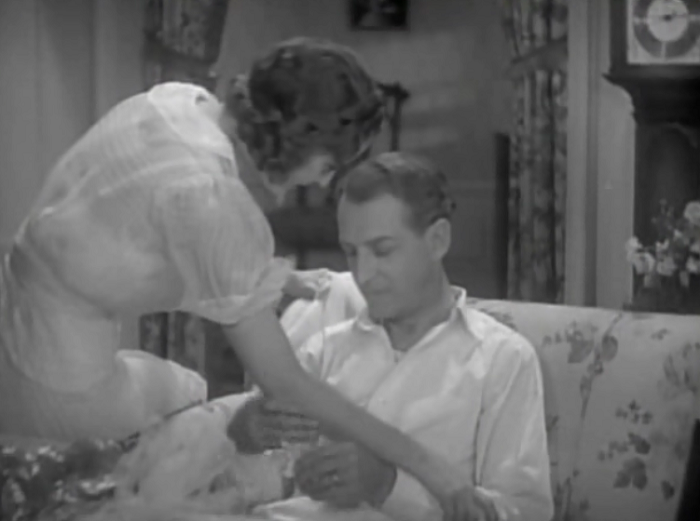
“Okay, next one of us gets cancer of the brain, and then the other contracts leprosy!”
Hugo loses his cool temper after the dog. He knows the parents of the kids who did it will probably side with the kids in murdering a German dog rather than sympathizing with a German-American man. Hugo sends Mary back to her family, and then sends her a letter telling her that he’s had enough of America and is joining up with the German army. She’s heartbroken.
The third act lets all of this ramp up to a conclusion which, bizarrely, seems to contradict much of what came before it. Mary has decided to become a barmaid in France for the American army (I had no idea this was an option), where she discovers Hugo sitting at a table, watching the troop movements. Yes, he’s become a spy for the Germans (despite his thick accent throughout the film, I guess), and, after Mary prevents Jeff from noticing him, he comes to her room to beg her forgiveness.
Mind you, he’s still going back to enemy lines tomorrow to report where the troops are and massacre Americans– look, he really loved that dog– and nothing Mary can say will change his mind. After spending the night together, she must decide whether to make the ultimate sacrifice to stop her husband from betraying the troops.
Spoilers.
She does.
End spoilers.
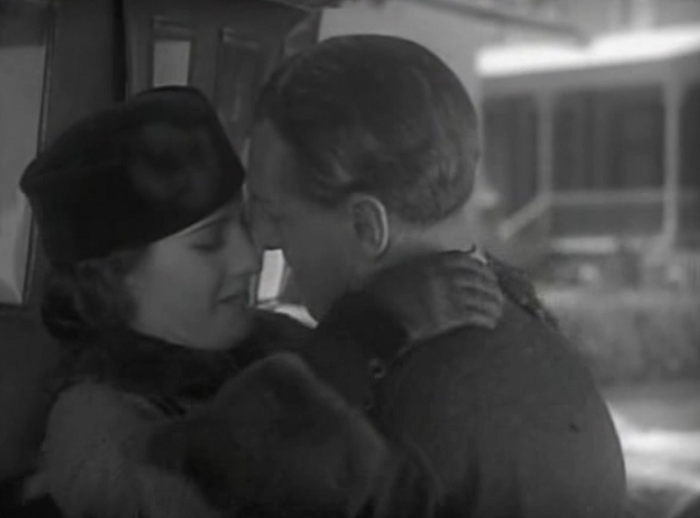
You’re ever in my heart, even when you’re murdering thousands of my countrymen. Ya jerk.
A lot of the problems here seem to stem from the fact that Hugo won’t change his last name to something more Americanized (something a lot of German-Americans did during those years), and how even his success at getting American citizenship is turned against him. Because of his pride in his heritage– something he shared with a great many other immigrants, as the film ably demonstrated– he has no choice but to go back to it.
That makes the third act’s twists with Hugo’s spying seem to justify the actions of the second act’s unfettered racial bigotry. The moral seems to be that if you don’t still love America with all of your heart after a bunch of people have beaten your dog to a bloody lump in nationalistic fervor, then you just don’t deserve to be an American. What a moral.
Stanwyck is good in a mostly thankless role as the backbone and ethical arbiter of the film, while Otto Kruger makes Hugo appropriately sympathetic and sweet. Director Archie Mayo succeeds with the film’s atmosphere splendidly, transitioning nicely from the home front to war. But all of these efforts combined can’t get past the film’s bombastic narrative and truly odd ending.
It’s a waste, and I hope someday we can see the same ideas about how moralizing fanaticism and judgmental proselytizing against those with a different racial composition irrevocably hurts our nation put into a better film. If only we had some contemporary example of it.
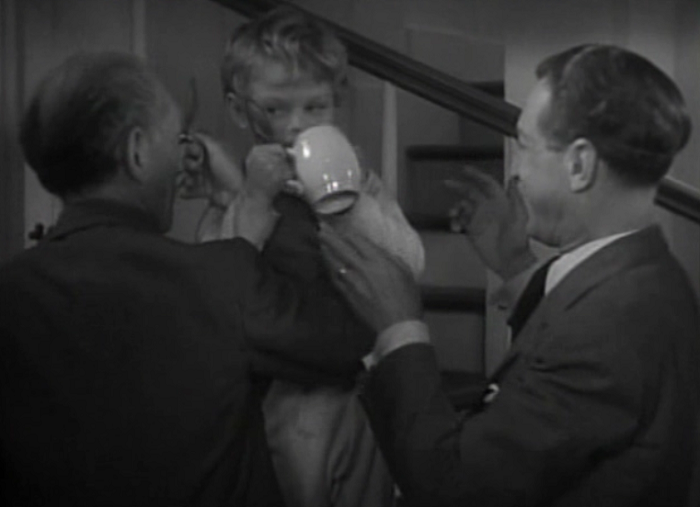
To being German-American in 1914! This couldn’t possibly end badly!
Trivia & Links
- Mondo 70 hits the important points, also mentioning how conflicted the ending is and that the movie “ends up more interesting than fully entertaining.” They also have an original advertisement for the film up, which shows how the studio tried to market it: by explaining nothing about the movie at all.
- Attesting to how obscure this movie is, even the usually handy TCMdb comes up short this week, noting that the movie cost $243,000 and was originally to star Kay Francis and Paul Muni.
- The pre-Code dog watch this week is actually a bonanza, since a dachshund figures heavily into the film’s dramatics, but I wouldn’t watch it for the dog to say the least. Here’s a picture of him in happier times anyway:
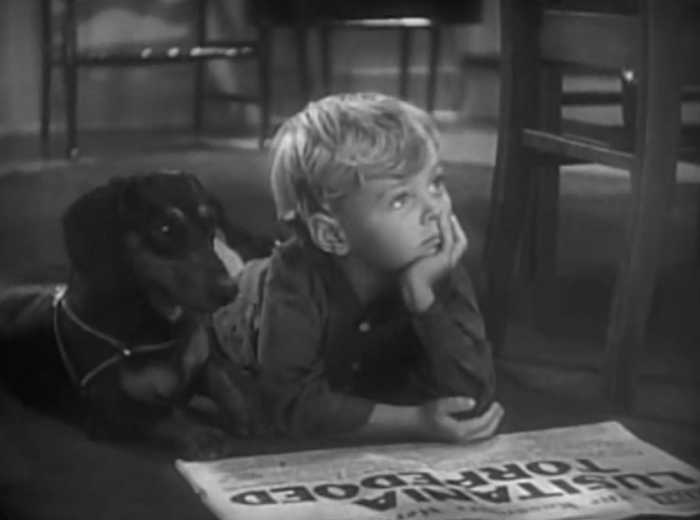
Dawww, I hope your tragic ends are waylaid for just a bit longer.
Awards, Accolades & Availability
- This film is actually fairly hard to come by, as I couldn’t even find any gray market sellers offering it. I suggest you look for it on TCM; hopefully Warner Archive will put it into a Forbidden Hollywood set one of these days.
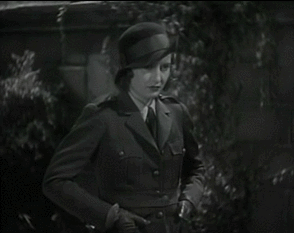 |
Comment below or join our email subscription list on the sidebar!Home | All of Our Reviews | What is Pre-Code? |




17 Comments
Phoebe · July 23, 2013 at 3:20 am
Hello! Is the email address on the site’s mail link current? (I sent a message on the 19th — did it arrive?) Thanks!
Danny · July 23, 2013 at 2:54 pm
It has indeed! I’m writing you back, I left town for the weekend and fell behind on my emails. 🙂 Thanks for your patience!
Patricia · July 24, 2013 at 7:25 am
While not my favorite film by any means, I did like Ever in My Heart better than you did. It’s not really awful; a bit overdone, but, if we look at what happened to the Japanese in WWII, probably not far from the truth for some German-Americans.
Danny · July 24, 2013 at 3:41 pm
Oh, I agree that the film certainly hits a vein of truth. The problem lies in the execution, where the melodrama becomes silly and the last act baffling. There’s a good subject here, I just wish someone could do it justice.
Brittaney · July 25, 2013 at 8:38 am
I was pleasantly surprised to find I really liked this film. I do love a good tragedy every now and then and this fits the bill. I thought both Stanwyck and Kruger did an excellent job in their roles and I really felt the turmoil and pain that they experienced. I thought this film did a good job of bringing the effects of prejudice to light. I did find the cousins/lovers thing very off-putting.
Danny · July 25, 2013 at 9:20 pm
Ha! Yes, I think the supreme casualness of the inbreeding may be more jarring nowadays than the racial hatred that gets riled up so easily. I’d like to note Ralph Bellamy also doesn’t get Barbara Stanwyck in Forbidden, but they’re not related in that one.
Judy · July 25, 2013 at 9:31 am
This sounds very interesting, tackling a difficult subject – I’d like to see it despite taking warning from your review about its inconsistency. Maybe Warner Archive will get round to it, as you say, Danny.
Danny · July 25, 2013 at 9:06 pm
I hope so, because at the very least it’s an interesting document on the terrible stuff Germans had to go through during WWI. It should be seen, even if it falls apart at the end.
Jim Stolpa · July 19, 2014 at 9:39 am
Surely a bit dramatic, but I just love Stanwyck and she still conveys human sensitivity and passion. I still liked it.
Danny · July 20, 2014 at 9:12 am
Stanwyck is great. I wish I liked the movie better, to be honest.
Jon Emerson · August 10, 2014 at 12:34 am
Could you please tell me where I can find a copy to buy of Ever in my Heart.
Thanks
Jon Emerson
jonemerson1@bellsouth.net
Danny · August 11, 2014 at 1:23 am
I wish I could help you. I caught it on TCM, and that’s your best bet for now I’m afraid. Good luck!
Des · April 16, 2016 at 9:55 pm
And Warner Archive have just released it on Forbidden Hollywood 10.
Danny · April 19, 2016 at 3:44 pm
Yes, I just saw that! I’ll try and update the screenshots and availability when I have some time this summer.
Jean · April 4, 2017 at 3:19 pm
It made me cry at the end, so I count that as successful. I’ve had a German pen pal for 63 years and recently met him. He had been part of the Nazi youth. My high school English teacher had us write to Germans at the end of WWII to begin to build friendships between former enemies. Germany is now an ally which makes me think it helped a bit. Nevertheless, Barbara had a horrible choice to make. I felt it deeply. Can movies teach us to make friends of enemies before full scale war develops?
I.B. · October 8, 2019 at 11:53 am
It’s 2019 and I enjoyed this movie. What I’m shocked about is no one mentioned the fact the Barbara Stanwyck is breastfeeding her baby. Wow!!! This is definitely pre-code
KenR · July 3, 2020 at 10:42 pm
It was odd to find this title added to a ‘Forbidden Hollywood’ volume, it’s quite a classic love story. Regardless of Stanwyck’s opinion of her early Warner/Vitaphone pictures, this is quite a surprising movie on several levels, and she is dazzling throughout. Its theme of propaganda, national bias and social intolerance remains strong and timely for many people to this day.
For its age, it remains good looking, even if a bit obvious by today’s standards. Many moving and serious situations play-out in its WW1 setting making this a forgotten gem – deserving to be seen by lovers of vintage classics. With a true Shakespearian ending, veteran director Archie Mayo and Si/Early Sound Cinematographer Arthur Todd, fill its fast-moving short running time with stylish visual class.
The WB Archive transfer DVD is good looking with fine sound
Comments are closed.